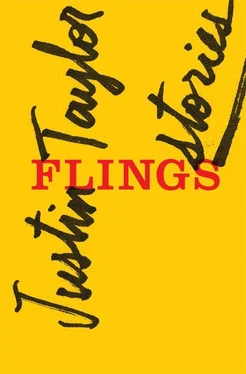Justin Taylor
Flings: Stories
Rabbi Pinhas often cited the words: “‘A man’s soul will teach him,’” and emphasized them by adding: “There is no man who is not incessantly being taught by his soul.” One of his disciples asked: “If this is so, why don’t men obey their souls?” “The soul teaches incessantly,” Rabbi Pinhas explained, “but it never repeats.”
— Martin Buber, Tales of the Hasidim
Oh, for a change of heart, a change of heart — a true change of heart!
— Saul Bellow, Herzog
Percy took Intro to US Labor History for an elective in the spring of his sophomore year. The professor’s name was Leon Pitzer, an embittered pinko genius with an august limp. In him Percy knew he had finally found the father surrogate he’d been searching for since arriving at Schmall, a semielite liberal arts college in a town of the same name in the heart of the heart of Ohio. Percy changed his major from English to history, and over the following three semesters took every course Pitzer offered. Pitzer directed Percy’s senior thesis, an inspired treatise on the American government’s illegal 1921 deployment of the Air Force to bomb striking mine workers at Blair Mountain, West Virginia. The SEIU invited Percy to come to Chicago and work on a hotel campaign. He talked to Kat about his decision. They both cried, but later, recounting the story to his best friend, Danny, on the porch over nightcap beers while Kat slept, Percy tried to make it sound as if only Kat had cried. Danny knew the truth because his bedroom was across the hall from Kat’s and he’d been listening in. “I don’t get what the whole big deal is,” he said to Rachel about it. “So he loves her, too. So what? Why is that some disaster? And what century does he live in where a man’s not allowed to cry?”
“Are you, like, preparing me for something right now?” Rachel asked. She lived around the block from Danny. They were between her sheets and he held her tightly, as though the bed were a dinghy in some rough sea and he meant to keep her from going over. Rachel and their other friend Ellen — both film students — had managed to get their mentor to secure them internships working for an experimental West Coast filmmaker who staged an annual festival in Portland, Oregon. It was not clear when — or even whether — Danny and Rachel would see each other again. “Please don’t say anything else,” Rachel said. Danny clenched his jaw. Not talking when he felt like talking was pretty much the hardest thing in the world for him, and there were few people other than Rachel for whom he would do it. He thought of a popular song he’d hated in high school, the one with the chorus that went “Well, I guess this is growing up.” He squeezed Rachel tighter, closer, begged her body to be his anchor, keep him from setting adrift in his own head. Nothing was going as anticipated. Her lower lip was between her front teeth. They enjoyed fast, rough sex and then she threw him out so she could shower and get dressed. She was due to meet her boyfriend, Marcus, for pizza. Instead of a good-bye kiss, or even a hug, they high-fived — a fierce flat sound that did not echo, and yet it rang in his ears the whole block home.
Danny knew he liked writing, and he knew he didn’t want to move back to Kettering, and he knew he didn’t want to stay in Schmall, especially not without his friends, but that was as much as he knew. So when a professor of his, presumably inspired by the STOP THE IMF! button on his backpack, offered to help him secure an internship at a prestigious-sounding New York political magazine that he had never heard of before, he told her he’d been a subscriber since he was fifteen and that it would be a dream come true. He printed out the application from their website and she wrote him a letter and the next thing he knew he was on a plane east.
His boss in New York had close-cropped hair and a permanent turtleneck: the arts and letters editor. One day they happened to return from their separate lunches at the same time and stood together in the low drone of the elevator. Danny ventured to comment that he was excited to see a new Branford Marsalis album coming out. He knew this because the editor had gotten a review copy in the mail earlier that day and, naturally, opening and sorting the editor’s mail was one of Danny’s several jobs. The editor brightened and asked if Danny was a fan, and Danny said, yes, he was. The editor asked what record Danny liked best and he said Without a Net , which the editor said he’d never heard of. Danny explained that it was a double live Grateful Dead record on which Marsalis sits in for a totally sick “Eyes of the World.”
Let this anecdote serve as synecdoche for Danny’s time in New York. Percy, meanwhile, had been relocated by the union to organize nursing homes all across Oregon state. He was moving to Portland, too! He took an apartment on Southeast Belmont Street in a low-rise building with open walkways across from a gourmet grocery store that he never once patronized. The first nursing home was in a town called La Grande, way out east in the Oregon desert — closer to Idaho than Portland. He lived in a motor lodge during the week and on Fridays drove the four hours back to the city. But for what? Nobody and nothing. Maybe drinks with Ellen and Rachel, if they were even around. He took his loneliness out on Kat, who was still back in Schmall. Not that he said it in so many words, but he was asking for her to come be with him. And who knew, Kat thought, but that maybe now they had a chance at the real thing.
So Kat sat around at the Belmont Street apartment while Percy was away all week organizing the nurses. He sent her lascivious promissory emails from his motel, and she responded in enthusiastic kind while IM-ing in a separate window with Danny in New York about his frustrations with the internship, her own boredom, and how despite everything it was honestly pretty cool. Gorgeous, cheap, progressive — the Great Northwest! Kat was looking for temp work. Once she had a job her days wouldn’t be so empty and long. And once the La Grande home was organized Percy would ask the union to give him something closer to base so he could actually live in his apartment, and then they’d just see what they saw — wouldn’t they? Danny supposed they would. “‘Portland’s a drawing card,’” Kat said, quoting that Raymond Carver story where the guy’s wife sells vitamins while he sneaks around with her friend.
Rachel had asked Marcus to go with her to Portland, but he was unwilling to give up his “good job” at the hardware store in Schmall. She’d decided to live alone rather than share a place with Ellen and Ellen’s boyfriend, Scott, a reasonably talented DJ with family money. It was assumed that Scott would soon propose to Ellen. He was balding, so his time seemed short, and it was understood among the friends that Ellen was bound to become famous like Miranda July. Ellen thought about how she’d phrase the Facebook update when the day came, or if instead she’d just post a picture of the ring on her finger, let the commentariat figure it out for themselves.
Rachel got a one-bedroom apartment on Couch Street—“couch” inexplicably pronounced “cooch” in the local demotic. She lived six blocks from Percy and Kat. The three ganged up on Danny about joining them. Percy and Kat said he could crash in their living room indefinitely; they had a futon. Rachel was notably silent on the subject of where Danny might live. Danny had fifteen hundred dollars in the bank. Since he wouldn’t be paying rent the money would last him awhile, which meant he could devote himself entirely to two objectives: (1) write the great American novel, despite having never experienced anything of significance other than Rachel; (2) Rachel.
Читать дальше












